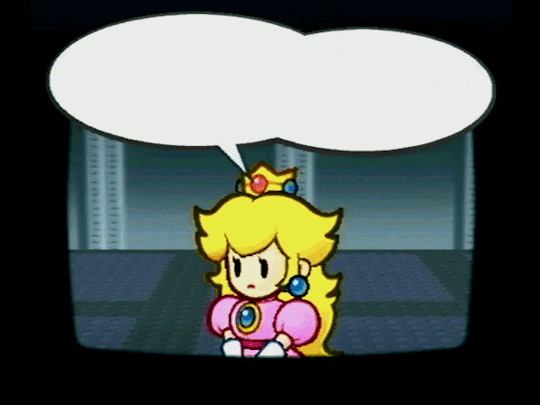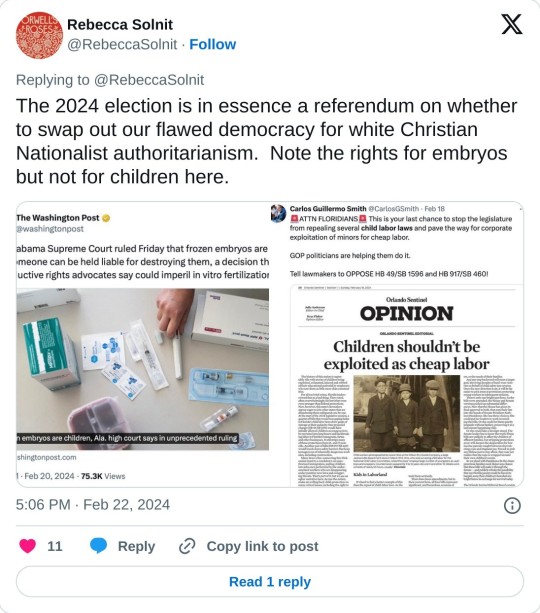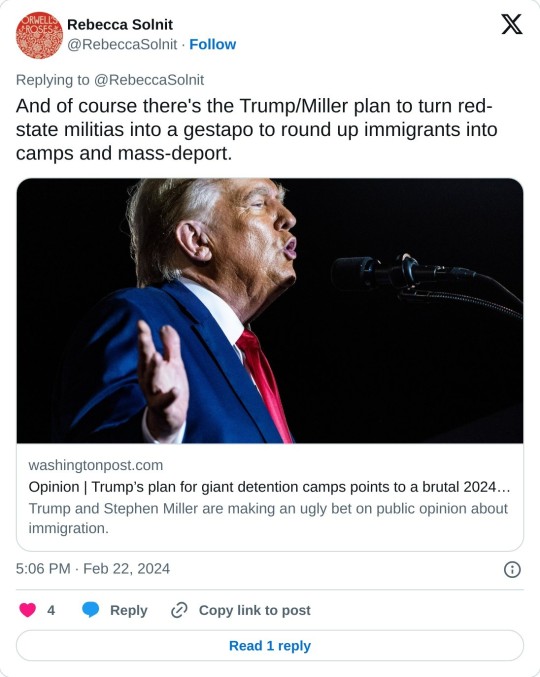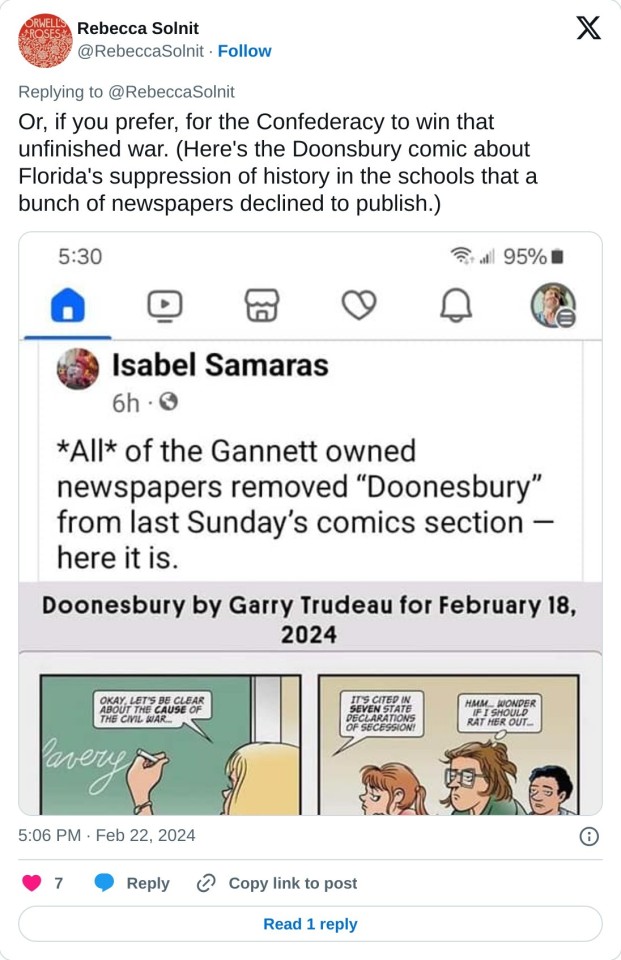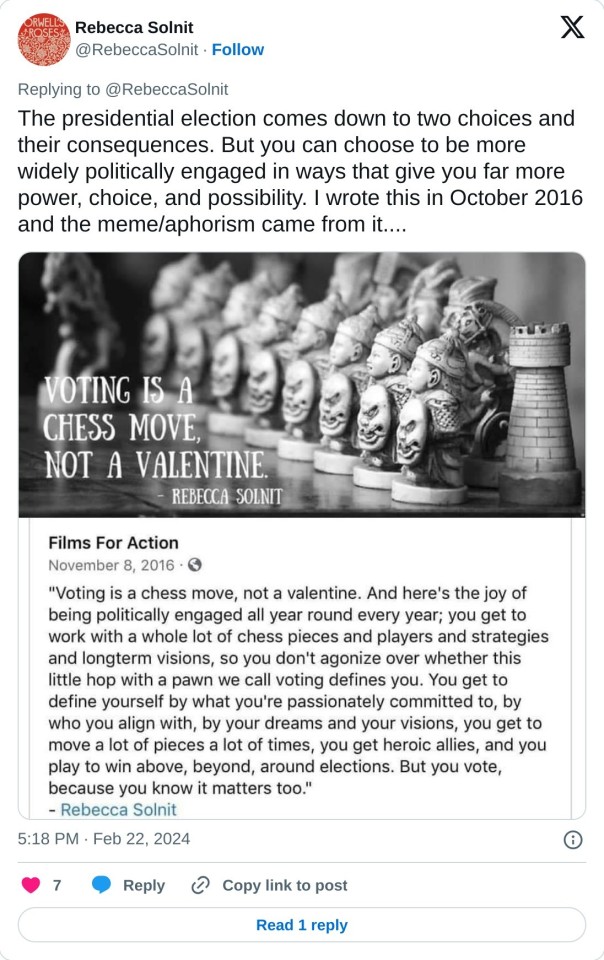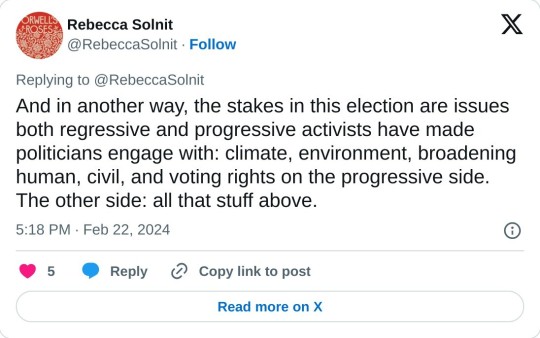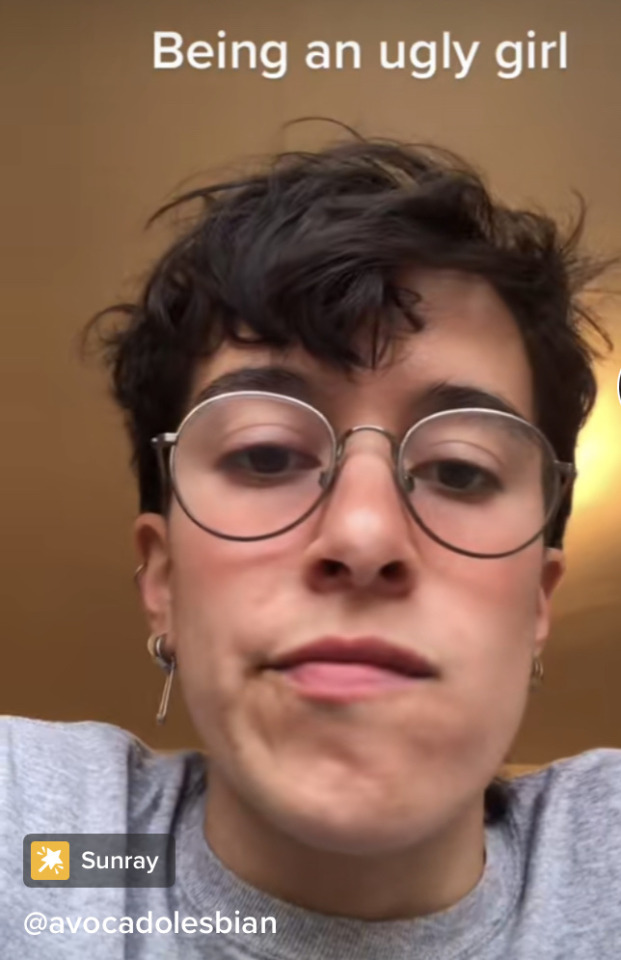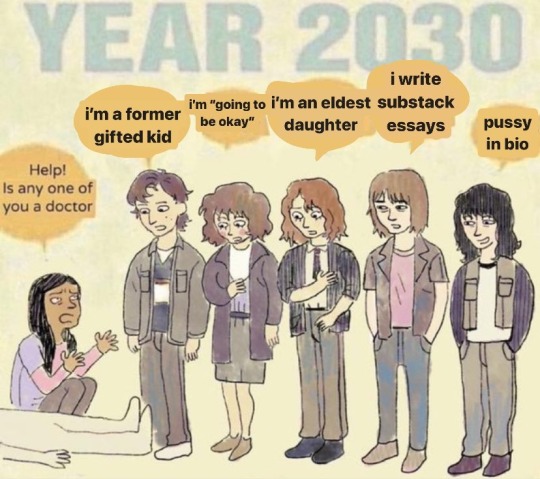Note
Relation between being queer (including questioning) and math skills
I’m great at math (queer)
I’m great at math (not queer)
I’m good at math (queer)
I’m good at math (not queer)
I’m okay/average at math (queer)
I’m okay/average at math (not queer)
I’m bad at math (queer)
I’m bad at math (not queer)
I’m terrible at math (queer)
I’m terrible at math (not queer)
It’s complicated (queer)
it’s complicated (not queer)
157 notes
·
View notes
Note
can lesbians* be bisexual?
yes
yes, it means they're trans-inclusive
no
only if they're nonbinary or genderfluid
only if they're using the split attraction model
*someone who currently identifies as a lesbian. not counting people who realized they were bi after initially identifying as lesbian
603 notes
·
View notes
Text
We’ve been chatting for about half an hour when Eloise lowers her voice to a whisper. Until now she’s been confidently talking through the ups and downs of being a 19-year-old woman in a world she finds unsteady.
She’s annoyed that, on TikTok, the advertisements she gets are keyrings with rape alarms and “stabby kitties” (a cat-shaped metal keychain with pointed ears sharp enough to cause damage), feels that modern feminism sometimes goes a bit too far, but having grown up in the age of nudes, she doesn’t really trust men. Which is unsurprising considering the story she tells me next.
“So a boy I know was asking a girl at his school for nudes,” she says, quietly. “And then when she refused, he threatened to rape her.” The boy was 14 and had recently posted an Andrew Tate video to his Instagram page, which was Eloise’s first encounter with the online influencer.
“It said stuff like how women are your property and that it doesn’t matter if women say they’ve been sexually assaulted; if you’re with them that’s your right. I didn’t like it,” she adds.
Tate has made several appearances in the headlines this week. On Tuesday, a Romanian court rejected his appeal to ease the ban on him leaving the country as a legal case against him – in which he’s charged with human trafficking, rape and forming a criminal gang to sexually exploit women – continues. He denies all charges against him. The following day, Ipsos polling for King’s College London’s Policy Institute and the Global Institute for Women’s Leadership found that one in five men aged 16-29 who have heard of Andrew Tate have a positive view of him.
Separately – or, arguably, perhaps not – another survey published in the same week underpinned a renewed focus on the attitudes and beliefs of Generation Z, this time from the Crown Prosecution Service (CPS). The research asked just over 3,000 adults of varying ages – 50.6 per cent of whom were female – about their understanding of rape and serious sexual offences, and the law on consent, and drew troubling conclusions.
Overall, 74 per cent of people surveyed understood that it can still be rape if a victim doesn’t resist or fight back, but the number fell to just over half (53 per cent) of 18-24-year-olds who had the same understanding. Less than half of respondents from this age group recognised that victims might not report a sexual offence to police immediately, that being in a relationship or marriage doesn’t mean consent can be assumed, or that if a man has been drinking or taking drugs, he’s still responsible if he rapes someone. More than 70 per cent of over-65s recognised that even if no physical force is involved a person might not be free or able to consent to sex, compared to just 40 per cent of young people.
Previous generations have become used to hearing that rape myths and misconceptions continue to persist, but that’s precisely why this week’s grim trinity of headlines stings. “There tends to be a public assumption that things are generally always getting better,” says author and feminist campaigner Laura Bates. “Actually, views like these are incredibly widespread among young people.”
Bates regularly works with schools, talking to pupils who often tell her that “rape is a compliment”, that “it’s not rape if she likes it” or, “it’s your boyfriend, you have to have sex with him”.
She adds: “Attitude surveys have to be taken seriously because they are a real red flag that we’re going backwards – we’re seeing much more extreme and concerning misogynistic attitudes among the youngest generations than we are among the oldest. We have to face up to that and ask, why is that happening?”
Gen Z has never been neatly contained. Growing up as the first digital natives in the chokehold of crisis – climate, Covid, cost of living – has seen them praised for their social awareness, but disenfranchised and forgotten by politics. Their extremely online nature has given them unprecedented access to the world and other people – but, of course, that’s a double-edged sword.
“The internet has made everyone’s voices louder, but that means the most misogynistic people in the world are heard more too,” says Niya Clement-Hickson, a 26-year-old marketing designer from London. He says his generation has been “kind of ruined” by social media.
“You’d be surprised at just how many people around my age will argue that Andrew Tate is not as bad as he seems.”
When I spend an hour talking to 16-year-old Tate fan Manus from Ohio on TikTok, he says exactly that. He’s relatively timid and seems unsure of what he thinks at times, but came across Tate aged 12, being drawn to his motivational speeches, humour, and attitude towards making money. “[Tate] kinda showed me how people really are in reality,” he says. On Tate’s assertions that women are the property of men, he says those beliefs are simply from the Bible (though Manus himself is Muslim).
He maintains he’s never seen Tate speak violently about women, and when I send him leaked voicenote recordings of Tate saying that he enjoyed raping a woman, Manus is certain it’s fake “probably to make him look bad”. I ask for his views on feminism and he responds that feminists now want “superiority” and “more rights”. What rights exactly? “More rights in general,” he says, vaguely.
This opinion is not a rarity – there’s a pervasive idea circling comments sections and pub corners that the pendulum has “swung too far”. “Some of us warned that when you continue to suppress their identity by telling young boys that they are inherently toxic, they’ll start acting irrational,” one comment under an Andrew Tate post this week read. But it’s not just boys who hold this idea. Early last year, a survey from Ipsos UK and the Global Institute for Women’s Leadership at King’s College London echoed this and some of Eloise’s views that feminism has gone too far. They found that 52 per cent of Gen Z and 53 per cent of millennials believe that we’re now discriminating against men. Less than half of Gen Z respondents said they defined themselves as a feminist.
Was it coincidence then, to see that shortly after the research was published in March 2023, the year of the girl was in full swing? A persistently pink summer was punctuated with girl dinners, #tradwives – modern women who believe in traditional gender roles – and stay-at-home girlfriends sharing their daily rituals on news feeds. New York magazine’s The Cut declared it “Woman in Retrograde” as the year came to a close; a cluster of reactionary elements to a significant demise of mainstream feminism.
This shift back to traditional behaviours is also present in younger men, says Niya. “A lot of guys feel that their role is all about providing money, being a protector. But they feel they deserve to get something out of the interaction. They just can’t deal with being told no.”
In terms of consent, does he hear attitudes that put women in danger? “Absolutely,” he replies. Niya didn’t learn about consent in school – “I don’t think it was ever talked about beyond ‘don’t have sex until you’re old enough’” – and thinks this is quite common for men of his age. For Maya, who’s 24 and neurodivergent, the line of consent is difficult to pinpoint and somewhat shaped by social media. There’s a “disconnect” from what she really wants – and is able to articulate – in the moment.
“I think that we do have less and less sex and more and more porn,” Niya adds. “And I think that once porn is your main and in some cases, only engagement with sex and women, then that is going to completely screw up how you see sex.”
Do all roads lead to porn? Probably. Clare McGlynn, who is a professor of law with particular expertise in sexual violence and online abuse, says: “We know that algorithms promote more extreme content, more hate – and many, many younger people, men and women, are getting this. Millions of people, as we speak, are watching mainstream online pornography that is racist, sexist, misogynist and violent in its content. Of course, it’s shaping attitudes and lives.”
“There’s certainly a pressure on young boys and men, for example, to be taking and sharing nudes – they’re part of a culture that is encouraging them to,” McGlynn explains. During a study, she looked at what material was presented on the homepage of popular sites – she found landing pages which were filled with sexually violent material. “So it’s also not them even actively choosing that material; we’re part of a culture that is grooming young men, teaching them expectations around sex – and asking them to accept and normalise it.”
What appears clear from the survey conducted by the CPS is a dangerous lack of understanding of what constitutes a crime. “I do lectures on criminal law and I’ve had students come up to me afterwards and say that they didn’t know they had been sexually assaulted or raped,” McGlynn adds.
Laura Bates says that we’re in the midst of a “crisis of sexual violence among young people”.
“Deeply misogynistic misinformation is being spread to young people online at a rate that most people just have absolutely no idea about,” she says. “And there is a massive knock-on effect.
“Some will look at these surveys and go, well, what does attitude matter? But you have to draw a connection between these really worrying attitudes about rape and the fact that nearly 80 per cent of young people told Ofsted inspectors recently that sexual assault is normal and common in their friendship groups.”
So what can be done? More responsibility and accountability from social media companies, says Bates. Tate’s content – some of which reportedly shows him attempting to beat a woman with a belt; she later hides behind a locked door – has been viewed more than 11 billion times on TikTok, she says, adding: “That’s more than the population of the planet.” Last year, advocacy group HOPE found that more 16-17-year-old boys had watched Tate’s content than had heard of Rishi Sunak. “I think it’s really important that the government supports high quality, age-appropriate sex and relationships education,” she adds.
Actively listening to and engaging with boys – as seen in initiatives like the state of New York’s Starting the Conversation campaign – is also important. Boys must have a safe and judgement-free environment to express themselves: the more their experiences of rape culture are internalised, the more difficult they are to see.
The Online Safety Bill, which was enacted in October last year, she says, was a missed opportunity for change. While it asks for more transparency on social media platforms and imposes sanctions for those not following the act, along with criminalising cyberflashing and sending unsolicited nude images, “it went 250 pages without mentioning women and girls once, until campaigners changed that”, Bates says.
“It’s so much more effective to focus on prevention of radicalisation than trying to unpick it once it’s happened,” she says. “Young people really are prepared to listen and prepared to change their minds, it’s just a shame this isn’t happening in every school.”
“It does make me worried about how safe the world is going to be,” says Eloise, who will begin her twenties in the summer. “What if people really start thinking that women are property again?” Then, she’s quiet again. “I really hope it can change.”
355 notes
·
View notes
Text
“A feminist perspective recognizes that the hierarchical organizing of the world around gender is key to maintaining social order.”
― Nivedita Menon
26 notes
·
View notes
Text
So I’ve been teaching 6th grade since January, and one thing about my female students which made me upset to realize is how many of them are obsessed with skincare. I've heard the girls in my class discussing the EYE CREAM they use. Like tf you mean eye cream? You're ELEVEN!!! I'm a decade older than you and have never even touched eye cream!! The most skincare a middle schooler needs is cleanser and moisturizer, maybe some acne cream. Who tf is selling you all this other stuff? Who tf told you you needed all this?
It hurts me to see. Their brains are too young for these types of insecurities 😭 no 11 year old girl should be obsessed with wrinkles, I wanna beat tf out of whatever tiktoker made them believe they needed skin that perfect
40K notes
·
View notes
Text
My new favorite genre of picture is a very special thing that most animals (and humans!) do: face nuzzling as an act of greeting/comfort/intimacy. thank God that this is happening all over the world right now
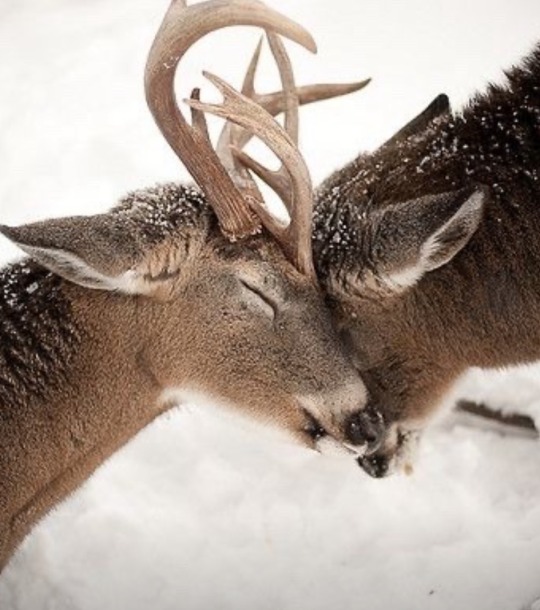

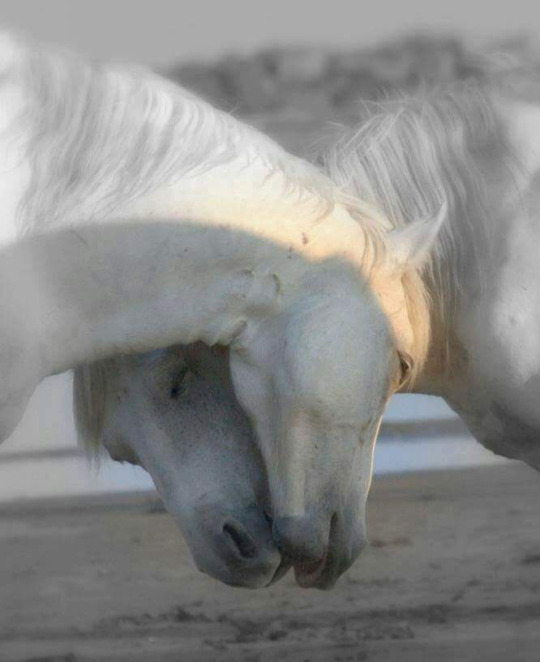
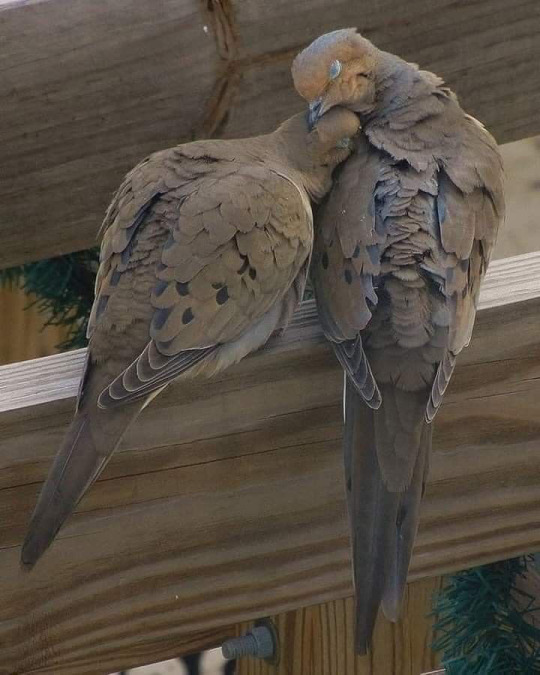
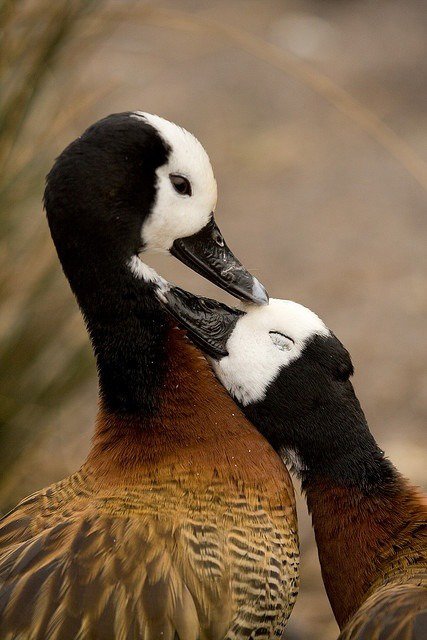
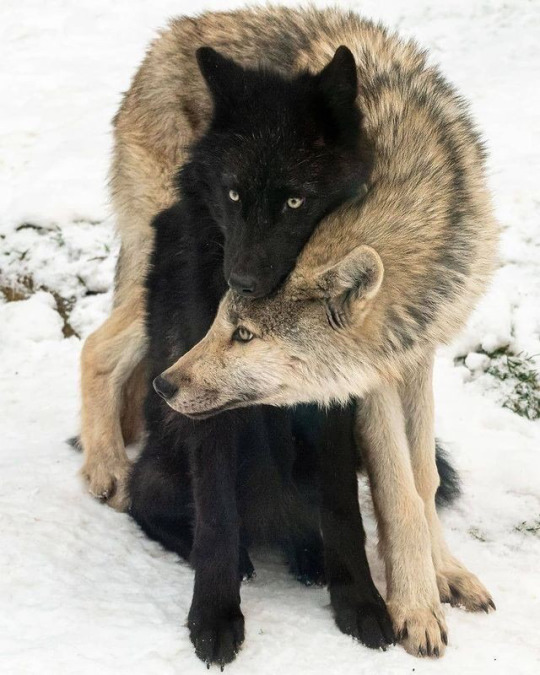
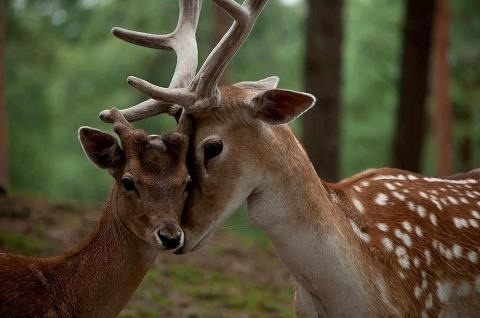

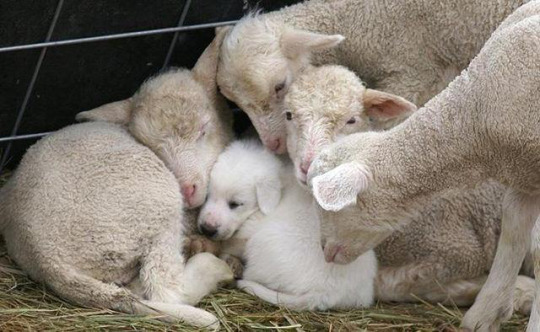
Isn’t it wonderful?!
74K notes
·
View notes
Text
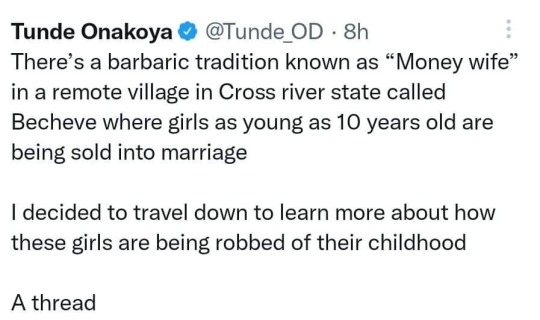
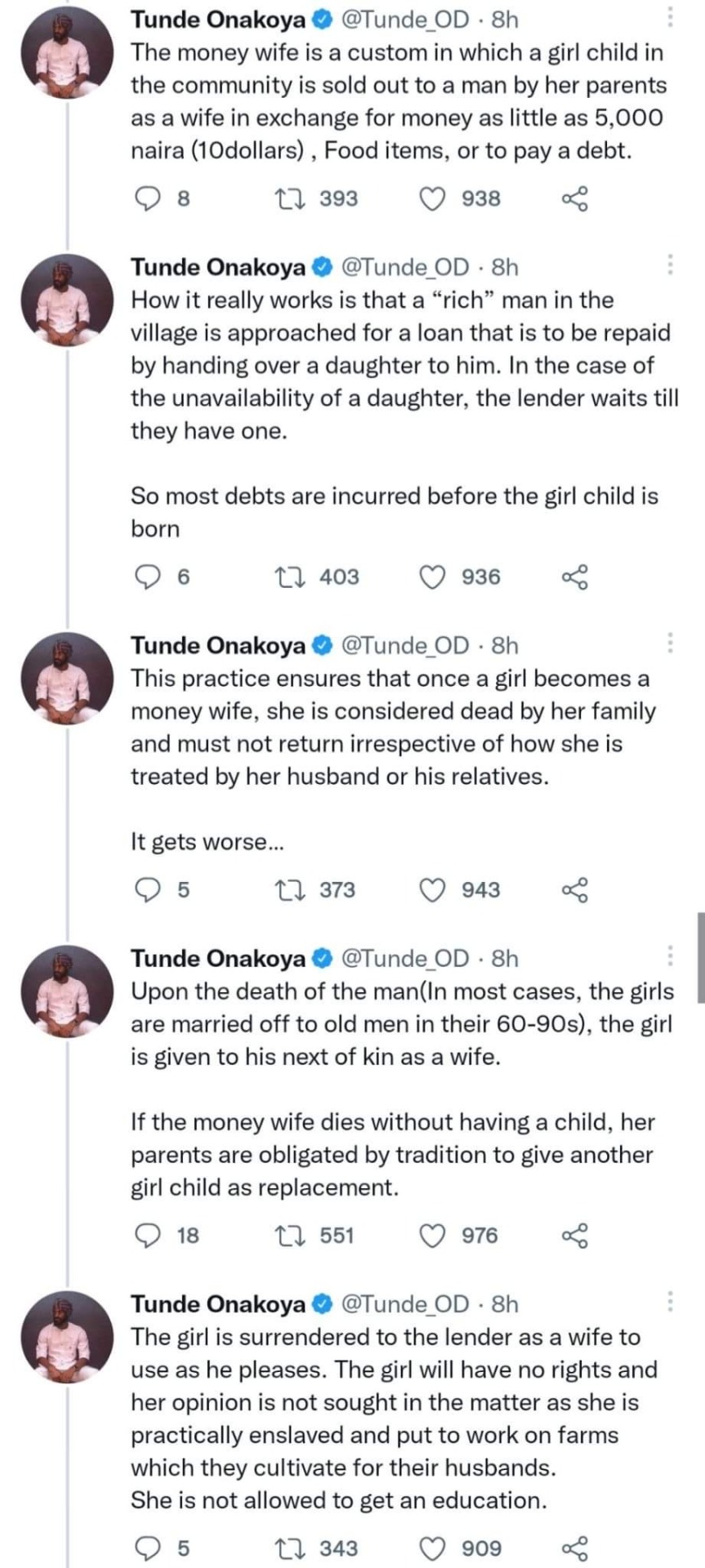
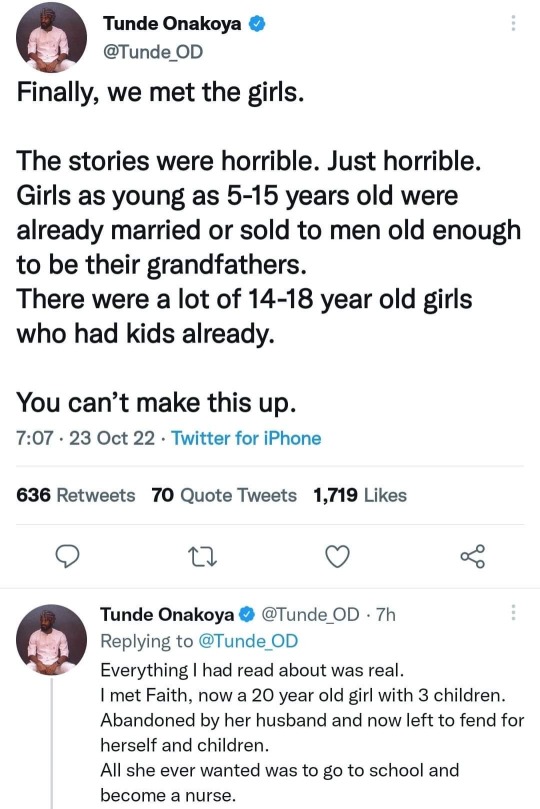
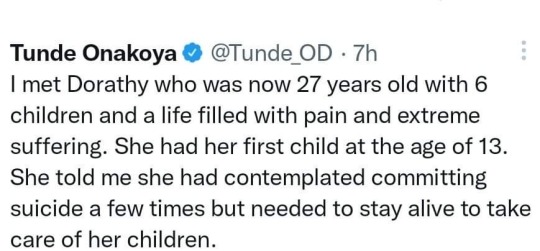
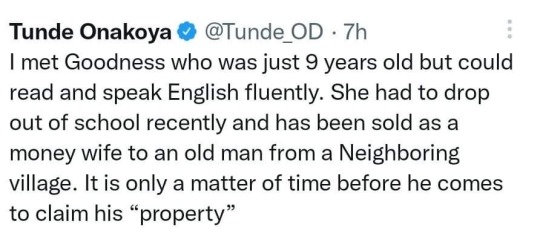
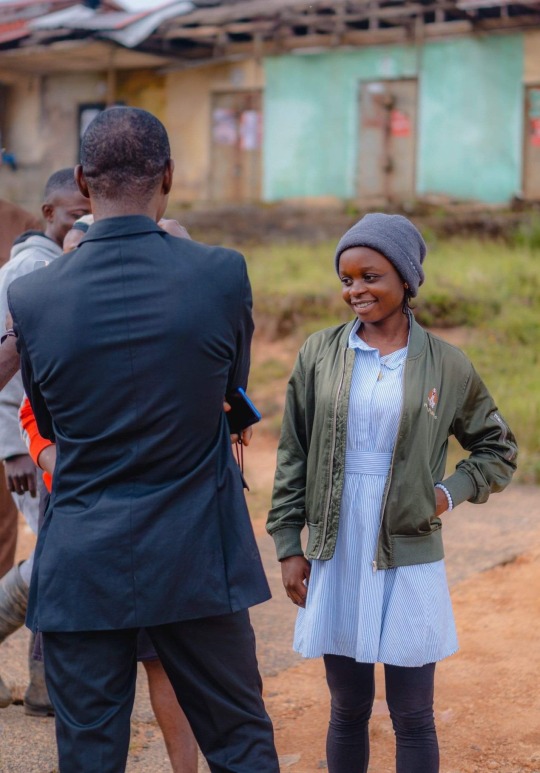
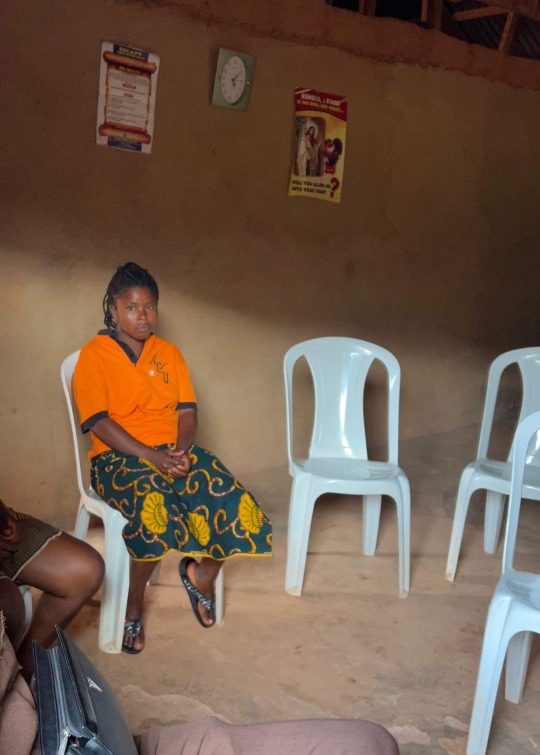

(x) “Money wives” aka culturally accepted sexual slavery of girls as young as 5-14 years in Cross Rivers State, Nigeria
2K notes
·
View notes
Note
Are you mtf ?
I am not. I am female and except for a few months where I tried out non-binary identity, have never had a cross-gender identity.
I’m not sure what the context of this question is. I do know many MTF (and a few FTM) people in real life and digitally, which has shaped my politics. Many of my MTF acquaintances struggle with homelessness and employment discrimination (due to their gender presentation) that keeps them trapped in a cycle of poverty, for example. As someone interested in the broader project of social justice, I am of course interested in solving that problem.
I’m not sure why you thought I was MTF, but I hope that answers your question.
2 notes
·
View notes
Text
i kinda made this as a joke but imagine i start pumping out radfem minecraft parkour videos LOL
586 notes
·
View notes
Photo
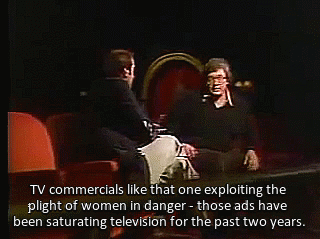
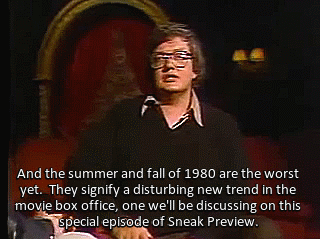

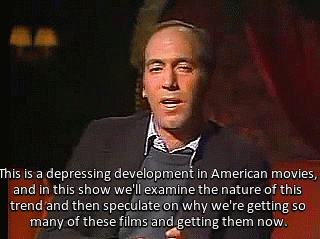
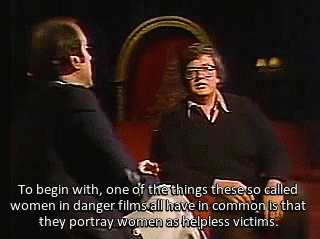

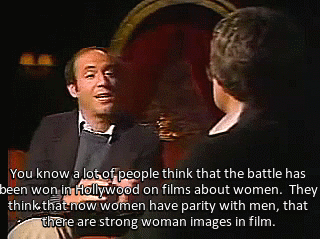
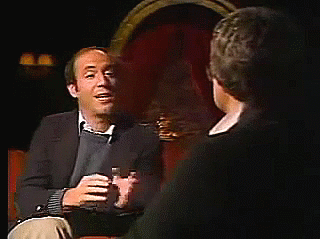


With all the heat Anita Sarkeesian gets for her Tropes series, you’d think it was a new topic, but Gene Siskel & Roger Ebert had a discussion on a similar theme when they were talking about the influx of slasher movies on their show in 1980.
(x)
69K notes
·
View notes
Text
I'm sorry but I think it's really weird when radfems reblog art with naked women that is just as passive as the art we criticize. I saw a piece where a group of women was just laying down and everybody was naked and they were all sleeping I guess? And because it was several women together then the use of female nakedness for decoration isn't a problem anymore? If they have three strands of pubic hair then it's different? That one male artist that draws black and white images with ballpoint ink too, why does he get reblogged on here so much? Ok the women are, idk, holding stars or something, but it's still so obviously a naked female body used for decorative purposes. You never see artsy naked men holding stars reblogged for "appreciation/admiration" or art of naked men sleeping in groups drawn with "aesthetic" colors
242 notes
·
View notes
Text

Girl on a beach in Oahu, Hawaii, 1973. Photo by Nick DeWolf
2K notes
·
View notes
Text
I hate that I've never been able to casually connect with most women I meet because I really don't relate to all the rituals of femininity, which have become one of the main things women bond over. I'm in no way masculine, but I've always felt so out of place and unwelcome when I find myself with a group of women that start talking about makeup or fashion or anything like that. I'm not trying to belittle these women at all but the fact that beauty rituals have become a casual thing for women to bond over makes it really isolating to be a woman who doesn't do any of that. And it gets worse when people describe "girlhood" and womanhood to be about these rituals. If I believed in gender this isolating feeling would definitely make me question if I was even a woman at all, and that is kinda tragic. I feel like the fight against gender roles is moving backwards.
1K notes
·
View notes
